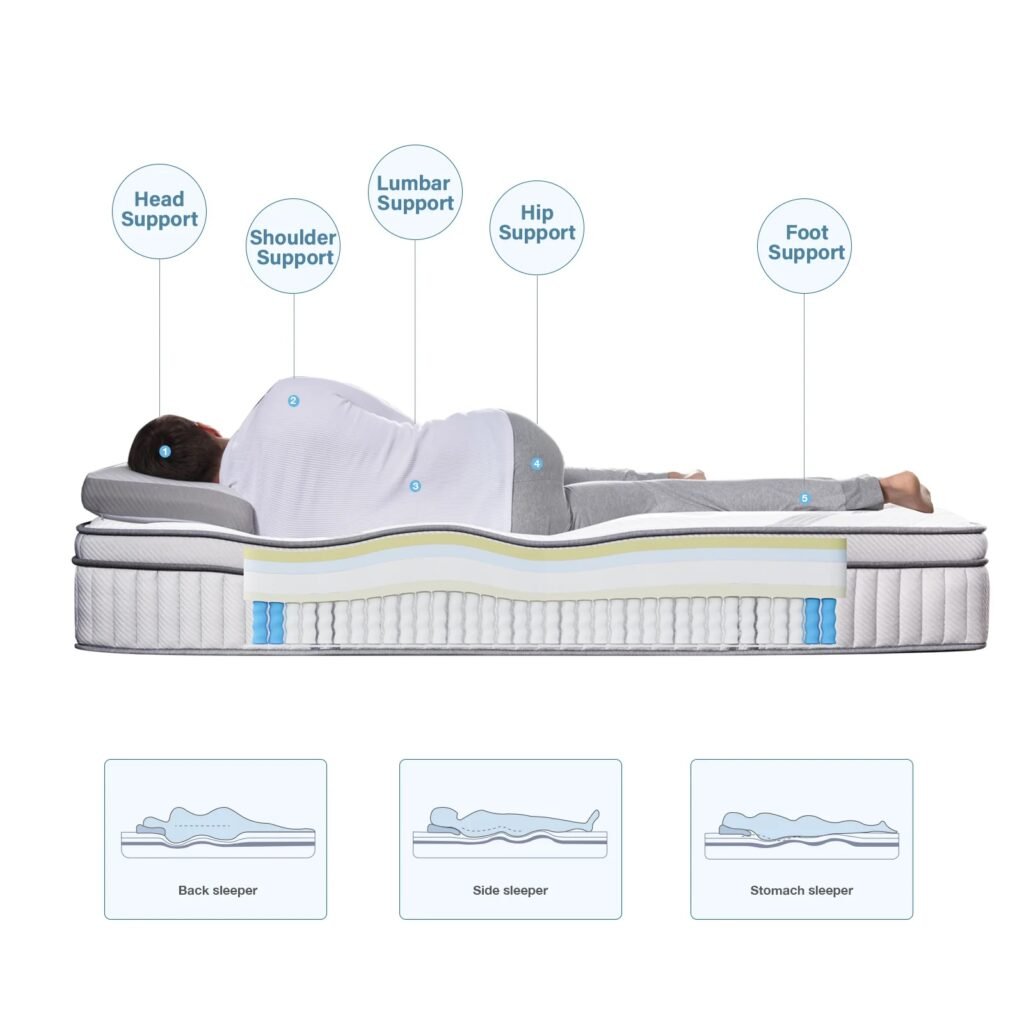Mattresses
Do Doctors Recommend Memory Foam Mattresses?
Table of contents

Our lives revolve around sleep, which also serves as a natural stress reliever, body regenerator, and builder of our general wellness. But in the flurry of modern life, making sure we get the best slumber possible frequently gets neglected. It is simple to undervalue the importance of getting a good night’s sleep until we are tossing and turning on a mattress that is simply not up to par.
The selection of your mattress is a crucial but frequently disregarded element in getting a good night’s sleep. Your mattress can make the difference between waking up feeling rested and ready to take on the day or feeling drowsy and agitated and counting down the minutes until bedtime.
Memory foam mattresses have been increasingly popular recently, promising a unique sleeping experience. These mattresses are designed to cradle your body and conform to its individual contours as you fall asleep, giving you a velvety, cloud-like experience. The big question, though, is whether or not doctors advise using them.
We begin on a voyage into the world of sleep science in this extensive piece. We’ll look into the potential health advantages of memory foam mattresses and examine the strong arguments for its popularity among sleep-conscious people. We’ll also look at whether these mattresses have the prestigious seal of a physician’s endorsement.
Stay with us if you’re considering buying a new mattress or if you just want to learn more about how your present mattress might be affecting your health overall and the quality of your sleep. We’ll provide you the information you need to decide if memory foam could be the best option for you in your quest for restful nights and energising mornings.
The Mechanism of Memory Foam
Viscoelastic foam, which NASA originally designed for astronaut seats, is the base material used to make memory foam mattresses. This foam reacts to pressure and heat, conforming to the shape of your body and dispersing your weight equally. By straightening your spine and releasing pressure spots like your hips and shoulders, this trait offers exceptional support and comfort. The outcome? a more pain-free and peaceful night’s sleep.
Why Physicians Might Advocate Memory Foam

For a number of reasons, doctors frequently suggest memory foam mattresses:
Pressure relief
Memory foam’s exceptional capacity to adapt to the contour of your body makes it easier to evenly distribute your weight across the mattress. People with persistent pain disorders like fibromyalgia or arthritis will benefit most from this. Your chances of waking up rested and free of the aches and pains that can interrupt your day are increased when your body is properly supported and pressure points are reduced.
Spinal Alignment
A healthy back depends on proper spinal alignment. This alignment can be kept in check by sleeping on a mattress that provides support customised to your body. This is important since improper spinal position while you sleep might create chronic back issues.
Enhanced Sleep Quality:
Both physical and mental health benefit from uninterrupted sleep. Memory foam mattresses provide comfort and support, which improves the quality of sleep. A memory foam mattress could be a useful addition to your sleep routine, regardless of whether you deal with sleep problems like insomnia or simply find it difficult to get to sleep and stay asleep.
Considerations for Allergies
Many conventional mattresses can harbour dust mites and other allergens, and allergies can interfere with sleep. Memory foam is a better option for allergy sufferers because it is naturally hypoallergenic and dust mite resistant.
Improved Sleep

Improved support and comfort can result in better sleep, which is necessary for general wellbeing.
It’s important to understand, though, that what works for one individual may not necessarily work for another. Your healthcare practitioner is knowledgeable with your particular medical issues and may provide tailored guidance. Based on your unique requirements, allergies, and any current medical concerns, they can determine whether a memory foam mattress is acceptable for you.
The purchase of a mattress is ultimately an investment in your health and happiness. Your emotions, cognitive ability, and general physical health are all impacted by getting enough sleep. So it makes sense to choose your mattress carefully. Whether it’s memory foam or another kind of mattress, think about speaking with your doctor and carefully weighing your alternatives in order to make a choice.
Conclusion
Are memory foam mattresses recommended by doctors? While memory foam isn’t always prescribed by doctors, they frequently advise it to people who have particular sleep or health-related problems. Memory foam mattresses are an attractive alternative due to the advantages of pressure alleviation, spinal alignment, and increased sleep quality.
However, it’s crucial to speak with your doctor to establish whether a memory foam mattress is the best option for your particular requirements. Choosing a high-quality mattress can have a big impact on how well you sleep and feel overall. In conclusion, doctors may suggest memory foam mattresses for some patients, especially those who have particular health issues.
FAQ
While memory foam mattresses aren’t always prescribed by doctors, they frequently advise them to individuals who have particular sleep or health-related problems. Memory foam may be an appealing alternative for those with certain conditions due to its capacity to relieve pressure, straighten the spine, and improve sleep quality.
People who suffer from allergies, arthritis, chronic pain, or sleep difficulties can benefit from memory foam mattresses. They are also appropriate for bedsharers who want to minimise motion transfer.
Yes, memory foam mattresses can reduce pressure points and encourage appropriate spinal alignment to aid with back discomfort. To meet your unique needs, it’s crucial to select the proper firmness level, nevertheless.
Some people experience heated sleep on memory foam mattresses. Manufacturers have created cooling memory foam solutions to address this. Open-cell memory foam or foam with gel additives can aid in heat transfer.

